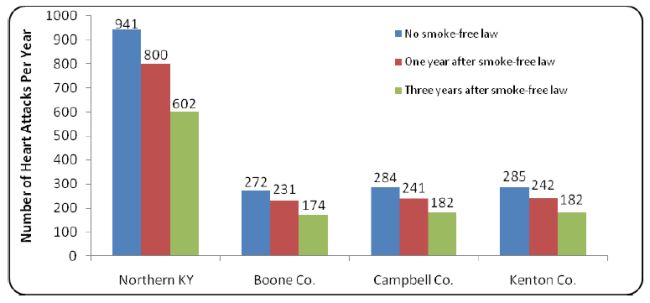- Even brief exposure to secondhand smoke can trigger a heart attack.3
- In just five minutes of exposure, secondhand smoke makes it harder for the heart to pump blood.4
- In 20-30 minutes, fat and blood clots build up in the arteries, increasing the chance of heart attacks and stroke.4
- After 2 hours of secondhand smoke exposure, the heart rate speeds up, leading to abnormal heart rhythms (which can lead to death).4
- The fine particles in secondhand smoke are linked to heart attacks.3
--------------------------------------------------------------------------------------------------------------------------------------------------------------------------------------------------------------------------------------------------------------------------
- Lightwood J, Glantz SA. Declines in acute myocardial infarction after smoke-free laws and individual risk attributable to secondhand smoke. Circulation. 2009;120:1373-1379.
- Lush CC. AMI Data-Calendar Year 2008-Boone Kenton Campbell Counties. Lexington, KY: UK Healthcare; data obtained from the Kentucky Hospital Association; 2010.
- Institute of Medicine. Secondhand smoke exposure and cardiovascular effects: Making sense of the evidence. Washington, DC: The National Academies Press; 2009.
- Otsuka R, Watanabe H, Hirata K, et al. Acute effects of passive smoking on the coronary circulation in healthy young adults. JAMA. 2001;286(4):436-441.
- U.S. Department of Health and Human Services. The Health Consequences of Involuntary Exposure to Tobacco Smoke: A Report of the Surgeon General. Atlanta, GA: Department of Health and Human Services, Public Health Service, Centers for Disease Control and Prevention, National Center for Chronic Disease and Prevention and Promotion, Office of Smoking and Health; 2006.

